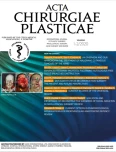-
Medical journals
- Career
Editorial
Authors: Assoc. Prof. Peter Tvrdý, MD, DMD, PhD
Authors‘ workplace: Olomouc, Czech Republic ; Head of Department of Oral and Maxillofacial Surgery, University Hospital and Palacky University
Published in: ACTA CHIRURGIAE PLASTICAE, 62, 1-2, 2020, pp. 3
Category: Editorial
Dear readers,
It is my honour and pleasure to have a few introductory words in this issue of Acta Chirurgiae Plasticae.
In the last couple of months, we have been experiencing difficult and, in a certain sense, also strange times. The pandemic has affected and changed us. More than ever before, we appreciate the value of our own health. And we are investing. In preventive measures, in urgent medical care, in public awareness, in the security of our future. And we are also restricting. We are postponing tasks that we have planned, we are avoiding social contact in public, all cultural and sport events have disappeared. Education has been maintained through homework and self-study. A lot of our everyday needs have suddenly become unreachable. And again, we are restricting. But this time, with a different purpose. Times like this give us an opportunity to slow down a little and take time to think. And again, we are investing. In our own family that have often suffered because of our absence. In our physical and mental well-being. In education. Or at least, we should.
I strongly believe that in the end, we will get through all this with success and life will lead us further on the unpredictable journey.
I am very glad that during this strange time of restrictions, investments, invested restrictions and restricted investments, it was possible to create another issue of Acta chirurgiae plasticae. This time, pieced together from articles focused on maxillofacial surgery.
Oral and maxillofacial surgery is distinct from any other specializations. It has been rooted in general medicine. In time, it has become a dental speciality and today, it is one of the recognized specializations, with the two fields contributing in its total coverage. Maxillofacial surgery still stays unique as it is the only specialization that links together both general and dental medicine in terms of education and training. A good maxillofacial surgeon must become a combination of a dentist, a dentoalveolar surgeon, a general surgeon, a traumatologist, an orthopaedist, a vascular surgeon, an otolaryngologist, a surgical oncologist, a plastic and a reconstructive surgeon. Therein lies the difficulty and the beauty of maxillofacial surgery.
Assoc. Prof. Peter Tvrdý, MD, DMD, PhD
Head of Department of Oral and Maxillofacial Surgery, University Hospital and Palacky University
Olomouc, Czech Republic
Labels
Plastic surgery Orthopaedics Burns medicine Traumatology
Article was published inActa chirurgiae plasticae

2020 Issue 1-2-
All articles in this issue
- AN OVERVIEW AND OUR APPROACH IN THE TREATMENT OF MALIGNANT CUTANEOUS TUMOURS OF THE HAND
- ENHANCED RECOVERY PROTOCOL FOLLOWING AUTOLOGOUS FREE TISSUE BREAST RECONSTRUCTION
- SKIN SUBSTITUTES IN RECONSTRUCTION SURGERY: THE PRESENT AND FUTURE PERSPECTIVES
- GUNSHOT INJURIES OF THE OROFACIAL REGION
- INDICATION AND IMPORTANCE OF RECONSTRUCTIVE SURGERIES OF FACIAL SKELETON IN MAXILLOFACIAL SURGERY: REVIEW
- Editorial
- CURRENT OPTIONS IN PHARMACOLOGICAL INTERVENTIONS FOR MICROVASCULAR ANASTOMOSIS PATENCY: REVIEW
- ACCIDENTAL FINDING OF SYNCHRONOUS BILATERAL DUCTAL CARCINOMA IN SITU IN A YOUNG MAN REFERRED TO MASTECTOMY DUE TO GYNECOMASTIA – AND WHAT IF LIPOSUCTION HAVE BEEN USED? CASE REPORT
- RED BREAST SYNDROME (RBS) ASSOCIATED TO THE USE OF POLYGLYCOLIC MESH IN BREAST RECONSTRUCTION: A CASE REPORT
- Acta chirurgiae plasticae
- Journal archive
- Current issue
- Online only
- About the journal
Most read in this issue- RED BREAST SYNDROME (RBS) ASSOCIATED TO THE USE OF POLYGLYCOLIC MESH IN BREAST RECONSTRUCTION: A CASE REPORT
- AN OVERVIEW AND OUR APPROACH IN THE TREATMENT OF MALIGNANT CUTANEOUS TUMOURS OF THE HAND
- GUNSHOT INJURIES OF THE OROFACIAL REGION
- SKIN SUBSTITUTES IN RECONSTRUCTION SURGERY: THE PRESENT AND FUTURE PERSPECTIVES
Login#ADS_BOTTOM_SCRIPTS#Forgotten passwordEnter the email address that you registered with. We will send you instructions on how to set a new password.
- Career


